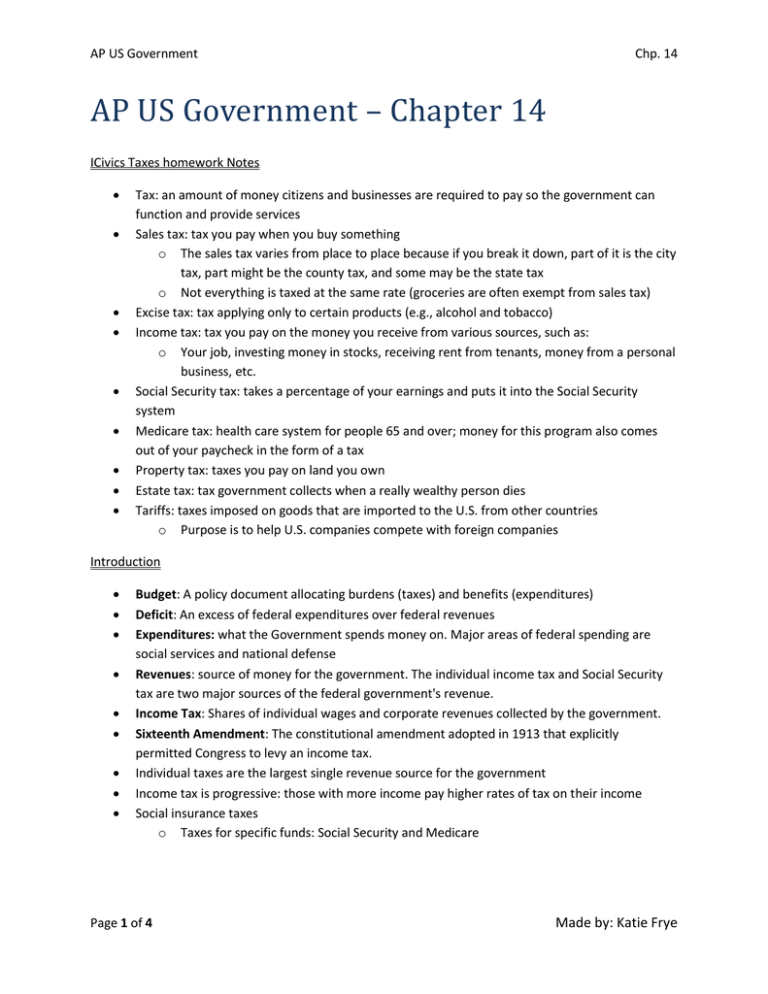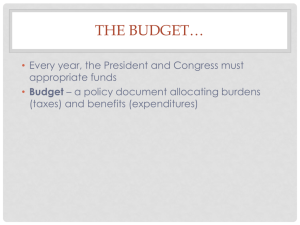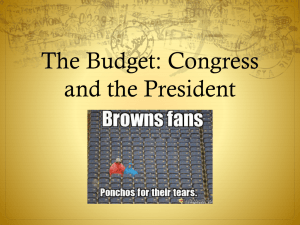Federal expenditures - Abby & Katie's Study Guides
advertisement

AP US Government Chp. 14 AP US Government – Chapter 14 ICivics Taxes homework Notes Tax: an amount of money citizens and businesses are required to pay so the government can function and provide services Sales tax: tax you pay when you buy something o The sales tax varies from place to place because if you break it down, part of it is the city tax, part might be the county tax, and some may be the state tax o Not everything is taxed at the same rate (groceries are often exempt from sales tax) Excise tax: tax applying only to certain products (e.g., alcohol and tobacco) Income tax: tax you pay on the money you receive from various sources, such as: o Your job, investing money in stocks, receiving rent from tenants, money from a personal business, etc. Social Security tax: takes a percentage of your earnings and puts it into the Social Security system Medicare tax: health care system for people 65 and over; money for this program also comes out of your paycheck in the form of a tax Property tax: taxes you pay on land you own Estate tax: tax government collects when a really wealthy person dies Tariffs: taxes imposed on goods that are imported to the U.S. from other countries o Purpose is to help U.S. companies compete with foreign companies Introduction Budget: A policy document allocating burdens (taxes) and benefits (expenditures) Deficit: An excess of federal expenditures over federal revenues Expenditures: what the Government spends money on. Major areas of federal spending are social services and national defense Revenues: source of money for the government. The individual income tax and Social Security tax are two major sources of the federal government's revenue. Income Tax: Shares of individual wages and corporate revenues collected by the government. Sixteenth Amendment: The constitutional amendment adopted in 1913 that explicitly permitted Congress to levy an income tax. Individual taxes are the largest single revenue source for the government Income tax is progressive: those with more income pay higher rates of tax on their income Social insurance taxes o Taxes for specific funds: Social Security and Medicare Page 1 of 4 Made by: Katie Frye AP US Government Chp. 14 Sources of Federal Revenue Income tax o Shares of individual wages and corporate revenues o The 16th amendment permitted congress to levy an income tax o Individual taxes are the largest single revenue source for the government o Income tax is progressive: those with more income pay higher rates of tax on their income Social insurance tax o Taxes for specific funds; social security and Medicare Borrowing o The Treasury department sells bonds –this is how the government borrows money o The federal debt is the sum of all the borrowed money that is still outstanding o The government competes with other lenders o The government does not have a capital budget Federal Debt o All the money borrowed over the years and still outstanding Taxes and public policy o Tax loopholes: tax breaks or benefits for a few people o Tax expenditures: revenue losses that result from special exemptions, exclusions, or deductions on federal tax law o Tax reduction: the general call to lower taxes o Tax reform: rewriting the taxes to change the rates and who pays them Tax reform act of 1986 – extensive tax reform Federal expenditures Big government, big budget o A big government requires lots of money o As the size of government increases, so does its budget The rise and decline of the national security state o In the 1950s and 1960s, the department of Defense received more than half of the federal budget o Defense now constitutes about one-sixth of all federal expenditures o One reason for growth of government Rise of the social service state o The biggest part of federal spending is now for income security programs o Social security is the largest program Social security has expanded since 1935 to include disability benefits and Medicare These benefit programs face financial problems with more recipients living longer Page 2 of 4 Made by: Katie Frye AP US Government Chp. 14 o Another reason for government growth Incrementalism o The idea that last year’s budget is the best predictor of this year’s budget, plus some o Agencies can safely assume they will get at least what they got last year o Focus and debate on the increase over last year o Budgets tend to go up a little each year Entitlement programs o Definition: policies for which expenditures are uncontrollable because Congress has in effect obligates itself to pay x level of benefits to Y number of recipients Example: Social Security “Uncontrollable” Expenditures o Spending determined by the number of recipients, not a fixed dollar figure o Mainly entitlement programs where the government pays known benefits to an unknown number of recipients Ex: social security o The only way to control the expenditure is to change the rules o Social Security, including Medicare, are the largest “uncontrollable” expenditure Costs $1.1 Trillion per year o Veteran’s Aid, Agricultural subsidies, Military pensions, civil service workers’ retirement benefits, and interest on the national debt The budgetary process Stakes and strategies o All political actors have a stake in the budget o Try and tie their budget needs to national or political needs The players o Lots of players, with the president and Congress playing important roles o Almost all committees are involved in the budget The President’s Budget o Presidents originally played a limited role in the budget o Now budget requests are directed through the OMB and president before going to Congress o The budget process is time consuming – starting nearly a year in advance o The OMB, the president, and the agencies negotiate budget requests Congress and the Budget o Reforming the process The congressional budget and impoundment control act of 1974: an act designed to reform the congressional budgetary process It established the following: Fixed budget calendar A budget committee in each house Page 3 of 4 Made by: Katie Frye AP US Government Chp. 14 o o The CBO, which advises Congress on the probable consequences of its decisions, forecasts revenues, and is counter weight to OMB Budget to be considered as a whole Budget resolutions bind Congress to a bottom line for the budget before Congress considers appropriations The current budget is then reconciled – program authorizations are revised to achieve required savings The new budget is authorized and appropriated Authorization Bill: An act of Congress that establishes, continues, or changes a discretionary government program or an entitlement. It specifies program goals and maximum expenditures for discretionary programs. Appropriations Bill: An act of Congress that actually funds programs within limits established by authorization bills. Appropriations usually cover one year. The Success of the 1974 Reforms Btwn 1974 ad 1998, every budget was a deficit budget Congress misses most of its own deadlines Congress passes continuing resolutions to keep the government going until it passes a budget Omnibus (enormous and complex) budget bills that often contain policies that cannot pass on their own More Reforms Congress passed bills to try and control the deficit By 1990 Congress focused on increases in spending Both parties claimed victory for the budget surpluses that began in 1997 Economic downturn, income tax cuts, and increases military expenditures brought a return to the deficits by 2001 Understanding Budgeting Democracy and budgeting o Many politicians “spend” money to buy votes o With many groups and people asking for government assistance, the budget gets bigger o Some politicians compete by trying NOT to spend money o People like government programs, but they don’t want to pay for them, thus there are deficits and federal debt Page 4 of 4 Made by: Katie Frye





